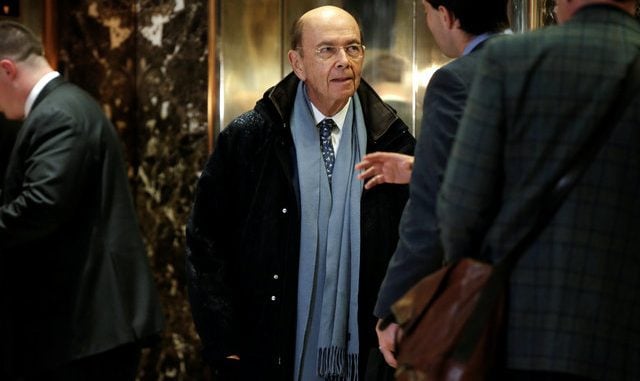
WASHINGTON, D.C. President-elect Donald Trump’s picks to head federal agencies paraded through Senate confirmation hearings this week drawing tough questions, praise and protesters. Secretary of State nominee Rex Tillerson, CIA head nominee Mike Pompeo, Defense Secretary nominee retired Marine Gen. James Mattis, and Dr. Ben Carson, nominee for Housing and Urban Development, all captured headlines talking about everything from Russia to a national minimum wage.However, Trump’s pick for Commerce secretary, billionaire investor Wilbur Ross, and Education nominee Betsy DeVos, had their confirmation hearings rescheduled as ethics officials delve into their financial disclosures and ethics agreement paperwork, searching for potential conflicts of interest. The review is standard protocol for nominees.Ross, whose testimony is scheduled for Jan. 18, may not make big headlines, but economists say his role could be one of the most impactful in the administration.When Ross salvaged two North Carolina textile mills, Cone and Burlington, from bankruptcy in 2003 and 2004 when the rest of the textile industry was crumbling, one of the first things he did was head to Washington to immerse himself in trade law and policy.China’s accession to the World Trade Organization had unleashed a flood of textile imports across U.S. borders, and Ross took an unusual hands-on approach, advocating for “safeguard” tariffs to help the ravaged domestic industry.”He was not the first outside investor to come into the industry and buy a major asset,” said Auggie Tantillo, who has lobbied for textile makers in Washington for almost 40 years. “He was the first, and to my knowledge only, major outside investor who took on that same sort of attitude that the more home-grown CEOs had.” According to industry experts, Ross’ history owning and defending embattled steel and textile manufacturing companies that have relied on border duties to protect their industries means he will bring a unique approach to the Commerce secretary job, departing from the traditional role of cheerleading for free trade and big business.If confirmed by the U.S. Senate, Ross, 79, who is personally close to Trump, will be a lead player shaping U.S. trade policy. He would be working alongside Robert Lighthizer, a lawyer known for his work with beleaguered U.S. manufacturers whom Trump has tapped as U.S. trade representative, and Peter Navarro, an economist and China hawk who will serve as a White House adviser.Free trade advocates worry the Trump trade triumvirate will be too quick to use tariffs to keep imports out, raising costs for manufacturers that rely on imported parts or even sparking retaliatory trade wars.”The three of them those guys put together can create a lot of mischief,” said Dan Ikenson, a longtime trade policy economist now with the Cato Institute think tank.A spokesman for Trump’s transition team said Ross would draw on his experience “saving and creating” manufacturing jobs if confirmed, and he would push to expand exports and reduce imports.Ross has worked with allies in trade unions and other industry groups hurt by imports to push for tariffs and quotas, even starting his own coalition in 2003. Though the coalition was short-lived, Ross’ rhetoric about the trade deficit and currency manipulation has remained consistent and was echoed on the campaign trail by Trump.Ross called the 20-year-old North American Free Trade Agreement (NAFTA) with Mexico and Canada the “poster child for unbalanced trade and investment,” in a letter to The Wall Street Journal. He has accused Mexico of importing auto parts from China for vehicles it shipped duty-free into the United States.But his companies have also produced goods in Mexico. The 2007 annual report for his International Textile Group called NAFTA “advantageous to the company” because of its factories there. And Ross supported the Central America Free Trade Agreement, saying he believed it fixed some of what he saw as loopholes in NAFTA.Ross has drawn an unusual endorsement for his manufacturing chops from the United Steelworkers union, which backed Trump’s Democratic opponent Hillary Clinton in the election.Senate Majority Leader Mitch McConnell (R-Ky.) said they hope to confirm six or seven of Trump’s nominees by Inauguration Day, Jan. 20. That figure is in line with the confirmation schedules of the past four U.S. presidents, but each of the last four also had at least one nominee fail to be confirmed.President Barack Obama struggled to fill the Commerce secretary post, withdrawing his first nominee, New Mexico Gov. Bill Richardson, after an ethics investigation plagued his nomination. His second choice, Sen. Judd Gregg (R-N.H.), withdrew his own name from consideration. Ultimately Washington Gov. Gary Locke was confirmed as Obama’s Commerce secretary and served until 2011. Currently, billionaire entrepreneur Penny Pritzker is serving as Obama’s Commerce secretary.Reuters News Service contributed to this report.



